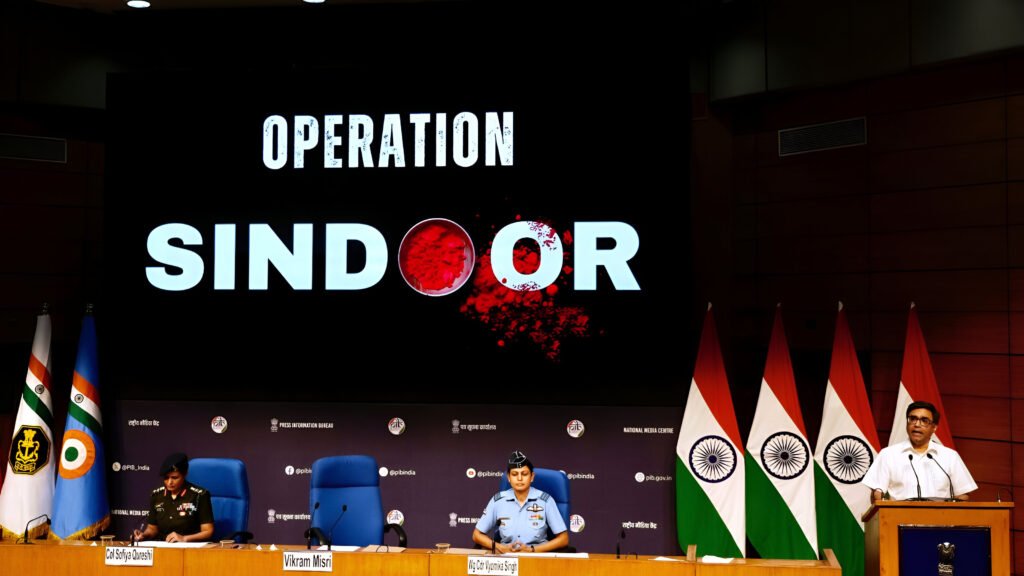
India initiated “Operation Sindoor” on May 7, 2025, a military retaliation to the “Pahalgam” terror attack. It aimed at multiple Pakistan and Pakistani-administered Kashmir areas, which India recognized as militant activity centers. This operation has further aggravated the already existing conflict between India and Pakistan, attracting international concern and alarm.
The Catalyst: Pahalgam Terror Attack
On April 22, 2025, Pahalgam, Jammu and Kashmir, suffered from an appalling act of terrorism resulting in 27 civilian fatalities, which included 25 Hindu tourists, 1 Christian tourist, and a local Muslim. The resistance front, an offshoot of banned terrorist group Lashkar-e-Taiba, was acquitted of the charge. India has blamed Pakistan for supporting the terrorists, resulting in an intercountry international quarrel and military conflict.
Operation Sindoor: Strategic precision strikes
The Indian Air Force on May 07 executed Operation Syndoor, which included a 23-minute precision attack on 9 different locations in Pakistan and Pakistani-administered Kashmir. The objectives of the operation were specified towards the eradication of militant infrastructure associated with Jaish-e-Mohammad and Lashkar-e-Taiba operations. The purpose is to destroy terrorist infrastructure using Rafale jets carrying SCALP missiles and AASM Hammer bombs.
Pakistan’s Reprisal and Aggression
As a consequence of the operations, Pakistan categorically stated that it regarded the operations as a “war crime” and allegedly brought down five Indian fighter jets. Crossfire along the LOC claimed the lives of innocent people from both countries. India, too, retaliated by hitting her security posts, which further worsened the situation.
International Reaction and Consequences
International stakeholders were quite worried about the situation. Secretary-General of the United Nations António Guterres has called on both nations to exercise self-control. China branded the forceful actions from the side of India as “unfortunate,” while Israel backed India for acting on preemptive self-defense. For their part, the United States branded it a “shame” and wished for a quick resolution.

Changes and Effects in Civilian Life
These developments have greatly disrupted lives, as many regions are experiencing blackouts, while domestic travel is virtually nonexistent and international flights are avoiding Pakistani airspace. SpiceJet, IndiGo, and Air India have all suspended domestic flights due to the conflict. Civilians are in a state of panic and confusion.
Historical Context: The Kashmir Conflict
The Kashmir region has experienced conflict between India and Pakistan since the partition of British India in 1947. The most recent violence is reminiscent of the Kargil War in 1999, the Balakot airstrikes in 2019, and other previous conflicts. The ongoing continental standoff that both countries maintain is still fueled by the undetermined status of Kashmir.
India’s Strategic Objectives
Operation Sindoor was aimed at sending an unequivocal message on the boundaries of terrorism while exercising India’s right to self-defense. India’s military action started with an attempt to wipe out militant structures and terror networks while minimizing injuries to non-combatants. This also served to strengthen public perception of India’s military capabilities as well as sustain support domestically.
The Road Ahead: Navigating a Fragile Peace
While both nations deal with the consequences of Operation Sindoor, the chances of de-escalation still appear slim. Diplomatic relations are at a standstill, and the possibility of other military confrontations is high. Striking a balance in mediation while encouraging dialogue without bias will help prevent a continental showdown.
Operation Sindoor stands out in the history of India-Pakistan relations, balancing regional security, counterterrorism, and diplomacy. In the coming days, it will become crucial whether both nations will have the capability to pull back from the edge and seek resolute peace.











